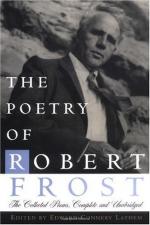|
This section contains 679 words (approx. 2 pages at 400 words per page) |

|
The Poetry of Robert Frost Summary & Study Guide Description
The Poetry of Robert Frost Summary & Study Guide includes comprehensive information and analysis to help you understand the book. This study guide contains the following sections:
This detailed literature summary also contains Topics for Discussion and a Free Quiz on The Poetry of Robert Frost by Robert Frost.
Robert Frostappears in Throughout
Frost's character is revealed to some extent in every one of his poems. He is revealed in his love for the natural world and the New England woods and seasons specifically, describing their most intimate details with detailed and nuanced understanding that could only come from affectionate and years-long observation. His sympathetic and admiring affection for animals is also readily observable in his poetry, even when he writes about the shortcomings of their instincts and the superiority of the human ability to reason, in his constant sympathy and respect for the animals and insects about which he writes. He also reveals a compassionate understanding of humans of every variety, and women in particular. His "Housekeeper", "Hill Wife" and "Silken Tent" all take broad views of the female race, as if he has spent a good deal of time considering their worlds and circumstances and had come to sympathize and admire the women who lived them. He is also a moralist, never preaching, but framing his thoughts in contexts that highlight their wisdom and envelope a broad cross-section of human experiences. He is a patriot, faithful to the ideals of the American experiment and the virtues manifested in those living the American experience. Overarching all that Frost is, he is throughout his writing life, a lover, both romantically inclined and eloquent in his expression of the thoughts he thinks in that category, and a lover of humanity as a race, aware of its foibles and shortcomings, but steadfast in his affection for it nonetheless.
Gardenerappears in Tuft of Flowers
The gardener who concludes that people work together, whether together or apart when he sees that the gardener who came before him left a tuft of flowers at the edge of a creek when he was cutting the grass before him.
The Boy with the Burning Glassappears in At Woodward's Gardens
The little boy who was burning the noses of monkeys caged at the zoo with his magnifying glass, never thinking that they would be able to do anything with it as smart as what he was doing, until they dismantled it and proved that it's knowing what to do with a thing that counts.
The Itinerant Preacherappears in Snow
The preacher who broke his trip at a farm between town and his town demonstrates Frost's love for the symbolic with his commentary on the page in the book on the table as well as his affection for simple, country values as he found amongst his fellow New Englanders and that he gives to the preacher as monologue as he takes his rest.
The Man Who Doesn't Like the Wallappears in Mending Wall
Frost offers commentary in the voice of this man on the outdatedness and shame of a wall between neighbors breaking up a landscape on which there are no animals who might invade a field. He spoke the human tendency to prefer freedom to walls, but in the end respected the perspective that others might just prefer them.
A Lone Strikerappears in A Lone Striker
The man who preferred the natural world to the work world, and so didn't go back to work on a beautiful afternoon.
The Man Who Loves Treesappears in To a Young Wretch
The man who has to reconcile his love for trees standing under stars in a forest with his Christmas spirit and desire for the family who took the tree to enjoy it.
The Hill Wifeappears in The Hill Wife
The woman who lives a lonely life with her husband and finally flees it, and with whom Frost eloquently sympathizes simply by telling her story.
The Bearappears in The Bear
A childlike and wildly playing bear whom Frost facetiously calls a student of Aristotle.
The Patriotappears in For John F. Kennedy His Inauguration, The Black Cottage (Int
Frost defines a patriot as one who values the ideals on which his country was founded, believes the things the founding documents said should shape the future of his country, and will live by his convictions even when they are unpopular.
Read more from the Study Guide
|
This section contains 679 words (approx. 2 pages at 400 words per page) |

|




